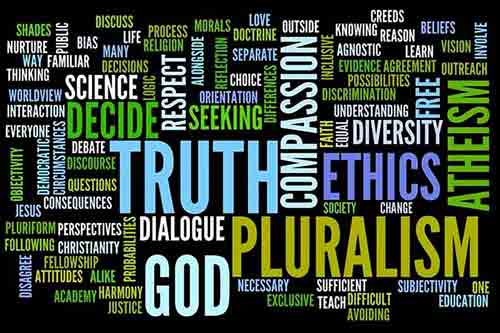
I was recently at a conference for religious educators. There were world-class presentations on social phenomena, ethical issues, scientific developments, religious change, and so forth. Presentations were by atheists, Christians, Muslims, Buddhists, and Jews. There was discussion on everything from euthanasia, through refugees, to our understanding of happiness. [And I’ve just been to an ethics seminar – again with a good mixture of positions on faith by the participants].
Religious Education (or Religious Studies) is regularly misunderstood. It is often confused with evangelism or catechesis (or Religious Instruction). The confusion does not seem to be present in tertiary institutions where Philosophy, Ethics, and Religious Studies are presented by lecturers who follow a religion or who are atheists or agnostics. There, it is understood as an academic discipline on an equal footing with others.
In New Zealand secondary education, Religious Studies is available in the NCEA matrix – but few schools beyond faith-based schools provide it. Religious Education is not sanctioned in NZ state primary schools. As a result, “well-educated” Kiwis often have a significant blind spot in their education. Many have no real understanding of the place that religion plays in our world, our history, art, and culture. They can struggle to articulate an argument for the ethical positions that they hold. There can be little appreciation of those who are different to themselves in a multi-cultural, multi-faith global village.
Even those advocating for Religious Education can misunderstand what they are advocating in favour of – and thereby undermine their own enthusiasm for the discipline. I recently read an editorial in the Guardian which was arguing that “RE provides an important tool for understanding ourselves and where we’re going”. But in doing so, it said:
The peculiar difficulty of religious education, which distinguishes it from all other subjects, is that it deals with beliefs that are not true in the way that the facts of other subjects can be. The sciences deal in testable facts; pupils can and do rediscover by experiment the truths of physics or of chemistry and biology. In history, economics and even literature, there are methods of inquiry that will converge around the generally accepted picture of the world.
What this Guardian editorial writes is simply false.
That NZ cannot be understood apart from the role of the missionaries is as true in the Religious Education classroom as it would be in the History classroom. That John’s Gospel presents certain themes and uses particular motifs is as true in the Religious Education classroom as it would be in the English classroom. The discussion of Karl Popper’s understanding of falsifiability, studied in the Religious Education classroom, enhances Science rather than detracting from it. The exploration of bioethics, led in Religious Education by persons trained in ethical theories, complements what is learnt in the Biology classroom.
Religious Educators, of course, must be well trained – or the sort of confusion evidenced in the Guardian editorial will continue.
If you appreciated this post, do remember to like the liturgy facebook page, use the RSS feed, and sign up for a not-very-often email, …




Interesting Bosco.
Firstly that so much religious ‘education’ deals in apologetics rather than a more rigorous ‘discipline of thought’ such as in academics.
But also as you say the editorial, I have always said most disciplines require a ‘leap of faith’ in so much as ‘I was not there and must interpret what is reported to me of what happened’ or ‘I don’t know how to build say carbon-dating equipment, I must trust to the scientist who shows me’ etc etc.
Religious Education (education in a religion) is not the same thing as Religious Studies (education about religions).
The latter is fine in secular schools. But in religious schools, the former is absolutely a core part of the school’s reason for existence.
Pupils may or may not emerge from the school as believers. But they at least have the opportunity to – which is not something that Religious Studies provides.
I am not sure what you are saying, Mary. I don’t know what you mean by “in” in “education in a religion”, and I have never seen that as a definition of Religious Education. Religious Education is normally understood as learning about and from religions. I don’t know if you are writing within New Zealand’s context, but the NZQA assessments used for Religous Education here, and pertinent to what you call “religious schools” are the “Religious Studies” Achievement Standards of NCEA. We are all, in some sense, “believers” – and certainly, Religious Studies provides opportunities for emerging as believers. Blessings.
I believe that she is attempting to differentiate between an indoctrination/catechism class taught by a school associated with a particular faith, such as the school where you work Father Bosco, designed to educate the students in their faith and a public school offering a general class about the various world religions.
This is an area, I think, where we become folks separated by a common language. I know that in North America public schools are run by a local school district/system paid for by local, state and federal taxes. Where, like in England, perhaps other Commonwealth nations, a public school is what we would call a private school.
With the federal constitutional separation between church and state most of the countries in the Americas, the only type of class that can be taught in a public school would be a general course about the various world religions. Indoctrination/catechism classes in a public school would be unconstitutional.
I think you are correct, David. In some ways. Enter the new problem: the word “public” in “public school”. In England and Wales, a public school is a long-established, student-selective, fee-charging independent secondary school. Here, in NZ, a public school is a state school 🙂 Second problem: at the school where I am chaplain, the Religious Education curriculum covers six world religions, philosophy, and ethics – and I would refer to what you call “indoctrination/catechism class” possibly as “Religious Instruction”. In NZ, anyone teaching Religious Education seriously would follow the undergirding understanding of Religious Studies, Philosophy, and Ethics – a school version of what would be offered at University. Blessings.